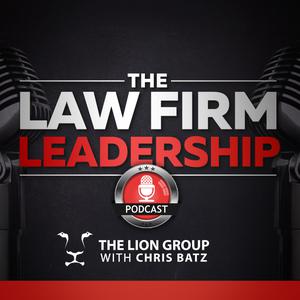
The Law Firm Leadership Podcast | We Interview Corp Defense Law Firm Leaders, Partners, General Counsel and Legal Consultants
Chris Batz and The Lion Group
We Interview Corp Defense Law Firm Leaders, Partners, General Counsel and Legal Consultants
- 22 minutes 59 secondsEP #49: Why Corporate Law Firms Merge with Chris Batz
“It’s astonishing; it’s just mind-blowing,” says Chris Batz about the exponential growth in revenue generated by the AmLaw top 100 firms in the last 22 years. On today’s episode of The Future is Bright, Chris takes a closer look at these numbers, what’s driving them and which firm comes out on top. He also takes a look at the increasing number of firms who are choosing to merge in order to, among many reasons, increase competition, deepen their benches, and to increase their geographic reach.
On his first solo episode of the podcast, Chris draws from quotes from executives at several high-profile firms who explain their motivation for merging. So often, it was a matter of shared values—very often people-focused values—aligning and that the decision benefits the internal teams just as much as it does the client. Chris, who is now exclusively focused on assisting firms with this process, offers his own insights on the topic.
Join today’s episode of The Future is Bright to learn how far corporate law firms have come in the past 20 years, and what it means for the future.
Quotes
-
“I am assisting firms where they are really feeling the effects of these incredibly large law firms and the consolidation that is taking place at a rapid pace right now.” (3:08 | Chris Batz)
-
“Twenty-two years ago, in 2002, there were only two law firms that were generating a billion in revenue annually, a year. The other 98 were, of course, less than a billion in revenue. Twenty-two years later, it is astonishing, but more than half—54 firms—now, of the AmLaw100, are generating more than a billion. To break that down, 33 firms are generating a billion to just under 2 billion. The two to three billion mark, or just under three billion is 14 firms. And then we have three billion and more—seven firms. It’s just mind-blowing.” (4:44 | Chris Batz)
-
“We’ve had substantial consolidation, explosive growth, and of course, there have been price increases, clients are reducing the amount of firms they’re working with, generally speaking. They’re finding firms with broader benches and deeper benches, especially sub-specialties is a really important thing, as well as geographic reach.” (7:11 | Chris Batz)
-
“Clients have ‘reputational risk.’ General counsel, the boards, CEOs, CFOs, decision-makers of these large clients. And perception—even though you think reality is different—perception shows that smaller firms are riskier decisions to give valuable work to. So, that valuable work goes to the bigger firms—not always, but consistently—it’s happening. Valuable being higher rate work, more headline-making work, probably requiring deeper benches, subspecialties, all these things, so that’s one of the reasons consolidations happen.” (17:30 | Chris Batz)
Links
Connect with Chris Batz:
LinkedIn Profile: https://www.linkedin.com/in/chrisbatz/
LinkedIn Company page: https://www.linkedin.com/company/columbus-street/
Columbus Street website: https://www.columbus-street.com/
Podcast production and show notes provided by HiveCast.fm
21 January 2025, 7:00 am -
- 36 minutes 39 secondsEP #48: Leading the Way as a Values-Based Law Firm with Kristina Lawson
“It’s all about people management,” says today’s guest Kristina Lawson, drawing parallels between her time as the former mayor of Walnut Creek, CA to her current role as managing partner at Hanson Bridgett LLP, a mid-sized firm which like Kristina, whose practice was in real estate and land use, has a deep connection and dedication to California and its communities. This values-based California law firm’s equity partners comprise nearly 40 percent women—virtually unheard of in the AmLaw 200—which reflects its pioneering and foundational policies of diversity, equity and inclusion. On today’s episode of The Future is Bright, Kristina discusses the firm’s guiding principles, their agile workforce policy that pre-dated the Covid 19 pandemic, and its exemplary approach to transitioning power to the next generation.
The key, Kristina explains, is a willingness to adapt to new working styles, seeing them as opportunities for growth rather than points of criticism. She also discusses the biggest threat to the business of law, the crucial piece of work culture she feels was lost to Covid, and how Hanson Bridgett LLP is navigating the advent of AI.
Join today’s discussion to learn more about Kristina and Hanson Bridgett LLP’s shared guiding principle of putting people first, and the number one issue that keeps her up at night.
Quotes
-
“It’s helpful to check back in, both to ground me and the reasons I joined Hanson Bridgett and what Hanson Bridgett’s all about, and again also to check in on those promises I made to our partnership about the direction we’d head in with me at the helm.” (7:32 | Kristina Lawson)
-
“Being the mayor of a mid-sized town and the managing partner of a mid-sized firm, there’s a lot of consensus-building and it’s all about people management. Whether it’s constituent management as the mayor or managing the other members of the city council…it’s all about figuring out where those consensus positions are and building trusted relationships, even with people that you don’t agree with, on key issues, so that you can continue to move forward. Those are really the same issues we have here at our partnership.” (8:20 | Kristina Lawson)
-
“We need to adapt to where they’re at. Just because they’re doing something differently, does not mean they’re doing it wrong.” (15:47 | Kristina Lawson)
-
“Founded by a group who really believed in diversity, equity and inclusion and values-based lawyering before it was a thing…One of the reasons I joined Hanson Bridgett was the firm has an equity partnership which is made up of just about 40 percent women.” (18:57 | Kristina Lawson)
-
“The number one thing that keeps me up at night is worrying about whether our people are well and whether we can improve their mental health and wellness as an organization.” (22:22 | Kristina Lawson)
Links
Connect with Kristina Lawson:
LinkedIn Profile: https://www.linkedin.com/in/klawson/
Firm Website Bio: https://www.hansonbridgett.com/Our-Attorneys/kristina-d-lawson
Connect with Howard Rosenberg:
LinkedIn profile: https://www.linkedin.com/in/hrosenberg/
Company web profile: https://www.baretzbrunelle.com/howard-rosenberg
Connect with Chris Batz:
LinkedIn Profile: https://www.linkedin.com/in/chrisbatz/
LinkedIn Company page: https://www.linkedin.com/company/columbus-street/
Columbus Street website: https://www.columbus-street.com/
Podcast production and show notes provided by HiveCast.fm
7 January 2025, 7:00 am -
- 37 minutes 40 secondsEP #47: Innovation and Growth in the UK Legal Market with Neville Eisenberg
“It is still quite challenging to convince partners of the need for change when the traditional model is still serving them incredibly well,” says Neville Eisenberg, Senior Strategy Executive, Mishcon de Reya, who joins The Future is Bright to talk about innovation taking place within UK law firms, innovation he helped contribute to with the contract attorney company, Lawyers on Demand, and now with Flex Legal, an alternative legal services provider now owned by Mishcon de Reya. Neville will discuss with hosts Chris Batz and Howard Rosenberg the growing number of opportunities in the alternative legal services provider market and what it means for private equity.
He'll discuss the changes which have taken place in the UK legal landscape as a result of deregulation and a number of legal processes now available in a self-service capacity, and what this means in terms of social justice. He will discuss the widely differing implications of AI on Top 10 law firms and on everyone below them, and the disconnect between supply and demand that he finds most concerning.
Learn Neville's thoughts on the crop of small high-performing law boutiques burgeoning in the UK and the importance of U.S. competition to the UK market.
Quotes
-
“It is still quite challenging to convince partners of the need for change, or indeed the value of spending money on doing things differently when the traditional model is still serving them incredibly well.” (11:40 | Neville Eisenberg)
-
“The Top Ten law firms in the UK generally regard Gen AI as likely to have a positive impact on their firms, in particular, because they see opportunity for productivity gains. But the rest of the Top 100, so the 90 firms below the top ten, have exactly the opposite, almost exactly, the opposite view of the impact of Gen AI in that they have significant concerns about the pressure that it might produce from clients to reduce cost of legal services and also that there may be a reduction in some of the work that’s outsourced to their firms.” (12:27 | Neville Eisenberg)
-
“Notwithstanding the deregulation, there is still—it appears to me from my conversation with clients—there is still a disconnect between the demand side and the supply side in the market.” (20:15 | Neville Eisenberg)
-
“One doesn’t have to be in a huge law firm to be successful. There is another model that can work.” (30:20 | Neville Eisenberg)
-
“It just seems to me that there is a very strong business case for many of these firms creating shared business services platforms that can benefit from scale economies, and all the other benefits of scale, and running those business services functions in a more effective way.” (32:51 | Neville Eisenberg)
Links
Connect with Neville Eisenberg:
LinkedIn Profile: https://www.linkedin.com/in/neville-eisenberg-47b2586/
Connect with Howard Rosenberg:
LinkedIn profile: https://www.linkedin.com/in/hrosenberg/
Company web profile: https://www.baretzbrunelle.com/howard-rosenberg
Connect with Chris Batz:
LinkedIn Profile: https://www.linkedin.com/in/chrisbatz/
LinkedIn Company page: https://www.linkedin.com/company/columbus-street/
Columbus Street website: https://www.columbus-street.com/
Podcast production and show notes provided by HiveCast.fm
17 December 2024, 7:00 am -
- 36 minutes 55 secondsEP #46: Noah Heller CEO of Katten Muchin Rosenman LLP on Leadership & Relationships
“Everyone deserves to feel like they matter,” says Noah Heller, who as CEO of Katten Muchin Rosenman LLP has built a culture of communication and connection, of being consistently authentic and operating with integrity in work and in life. He joins this episode of The Future is Bright to explain how his firm has evolved under his 12-year tenure by seeking to understand the needs of others, making himself genuinely available to those around him, and utilizing the power of personal relationships.
Noah also discusses his observations of the current U.S. legal market and his predictions for the coming decade. He explains his biggest surprise in taking on this leadership role, the greatest compliment he’s been paid and the one issue that keeps him up at night. He will also share his advice about succession planning for law firm executives.
In today’s discussion, you’ll learn how, by taking a genuine interest in people and their motivations, Noah was able to not only understand and meet, but exceed expectations to create a thriving workplace environment.
Quotes
-
“For me, it’s been a recognition that the power of my relationships is something that I should utilize as opposed to be[ing] afraid of.” (6:43 | Noah Heller)
-
“The thing that carried through really well between my practice and leadership was my ability to appreciate the importance of expectations, the importance of meeting and exceeding expectations, and also my ability to reasonably affect those expectations wherever I could.” (14:05 | Noah Heller)
-
“I’m so available and I care so much about my partners that I create a real—and it’s not fake, it’s real; it’s a real perception—that I’m there, I’m available and when they need me, they can reach out. And so the fact that so many people feel that they have so much of my attention, really, and my caring is really humbling for me. I try to do this job the way I try to live my life, if that resonates. I don’t put on a different outfit or a different persona the way that I lead this firm and the way I conduct myself in life.” (16:34 | Noah Heller)
-
“The thing that I’m the most proud of, that’s evolved in the time that I’ve been in this role, is the way people are treated within these four walls has evolved over time, and to me, that is really, really important.” (24:07 | Noah Heller)
Links
Connect with Noah Heller:
Law Firm bio: https://katten.com/Noah-Heller
LinkedIn profile: https://www.linkedin.com/in/noahsheller/
Connect with Howard Rosenberg:
LinkedIn profile: https://www.linkedin.com/in/hrosenberg/
Company web profile: https://www.baretzbrunelle.com/howard-rosenberg
Connect with Chris Batz:
LinkedIn Profile: https://www.linkedin.com/in/chrisbatz/
LinkedIn Company page: https://www.linkedin.com/company/columbus-street/
Columbus Street website: https://www.columbus-street.com/
Podcast production and show notes provided by HiveCast.fm
3 December 2024, 7:00 am -
- 43 minutes 40 secondsEP #45 The UK Legal Market with Greg Jackson of PwC
“I suspect in the UK we’re going to end up with some really deep, high-quality verticals…as opposed to lots of law firms having components,” says today’s guest Greg Jackson, Director of Law Firm Strategy and Transformation at PwC, who joins The Future is Bright to discuss this and many more predictions he has for the future of UK law firms. Along with co-hosts Chris Batz and Howard Rosenberg, Greg will compare UK firms to their American counterparts in terms of economics, leverage, rates and utilization, pay and expectations at the partner level, as well as yearly hours. He will explain why he’s changed his view—however slightly—on the idea of growth for growth’s sake, how the UK legal market is changing—including a particularly important one—and his advice for mid sized firms.
He will also explain how Alternative Business Structure will affect the UK model going forward and why U.S. outbound work to Europe is so important. He’ll predict whether or not the UK will adopt a hybrid model, marrying innovation with tradition, as well as what to do when you’ve been on a steady upward trajectory for a sustained period of time, and the issue that keeps his clients up at night.
What is the one thing that U.S. law firms do better than those across the pond? Join today’s episode of The Future is Bright to find out.
Quotes
-
“One of the projects that I always encourage clients to do—and I did in my old world—was, How do you situate your exec or board in a ten percent off the top line reduction? Whether hours or price or some combination of the two? Situate yourself in that issue and think, ‘What can we do about cash? What do we do with our clients? What work do you want to hold on to that we’re willing to go for a downward cycle, even if it’s painful?” (7:01 | Greg Jackson)
-
“I don’t know how this is played out in the U.S., but in the UK, in particular in the last 12 months, there have been a number of quite bad well-being incidents that have happened which have caused firms to really think about, ‘How do you connect utilization into an understanding of what people are doing?’ It can be quite hidden, to your point, big hours, etc.” (14:58 | Greg Jackson)
-
“When you think of what’s coming in terms of technology investment, lawyer salaries, the need to be more international and cope with more complex regulatory environments to operate in the U.S./UK, I just see a world in which you need more scale.” (19:47 | Greg Jackson)
-
“I suspect in the UK we’re going to end up with some really deep, high-quality verticals…as opposed to lots of law firms having components.” (24:22 | Greg Jackson)
Links
Connect with Greg Jackson:
LinkedIn Profile: https://www.linkedin.com/in/greg-jackson86/
Connect with Howard Rosenberg:
LinkedIn profile: https://www.linkedin.com/in/hrosenberg/
Company web profile: https://www.baretzbrunelle.com/howard-rosenberg
Connect with Chris Batz:
LinkedIn Profile: https://www.linkedin.com/in/chrisbatz/
LinkedIn Company page: https://www.linkedin.com/company/columbus-street/
Columbus Street website: https://www.columbus-street.com/
Podcast production and show notes provided by HiveCast.fm
19 November 2024, 7:00 am -
- 39 minutes 33 secondsEP #44: A Law Firm Merger of Equals with Scott Kadish and Kevin McLaughlin
“We wanted it to be a true merger of equals,” says Scott Kadish, who, along with Kevin McLaughlin, are Co-Managing Partners at the newly merged UB Greensfelder. On today’s episode of The Future is Bright, the two men talk to host Chris Batz about what can happen when two firms marry their considerable strengths to make themselves even more competitive and able to take on bigger, more complex work. It’s not an overnight process. It’s the result of long, thoughtful considerate discussions, where all concerns and needs are met, responsibilities are divided fairly and sensibly, and where care is taken to make sure that all employees not only survive the merger, but are placed where they will be most successful.
Even the new name UB Greensfelder was formed as the result of conscientious talks to ensure that neither firm felt that they were being acquired, but rather were moving forward together. While no merger is without its surprises, perhaps what’s most surprising was how genuinely compatible the firms felt with each other.
Today’s discussion reflects what a genuinely pleasant experience this merger has been for both parties and what can happen when two powerful entities treat each other with mutual respect and are thoughtful down to the smallest details.
Quotes
-
“Both firms were really coming at this from positions of strength…Both firms were recognized for their work in a number of different practice areas, diverse practice areas…We came together because we thought we’d be better together—we’re seeing that happen—not because we thought we were in desperation mode.” (5:14 | Kevin McLaughlin)
-
“Neither of us wanted to feel like we were being acquired. We wanted it to be a true merger of equals and that required a discussion about, ‘How do you do this and how do you do that?’ Every single policy. And it was a discussion—we use that word intentionally—because it wasn’t a negotiation…We also agreed—and I think this is key—that we were just going to try to figure out the best way to do it, the best practice, for everything.” (12:56 | Scott Kadish)
-
“I think it’s because of the length of time that we were talking that there really weren’t any significant surprises. Conflicts—our general counsel, at one point he said to me, ‘I am shocked at how few conflicts we’re having.’ And especially we didn’t have any what I would call ‘material conflicts’…in terms of impacting the overall firm, not really at all.” (29:44 | Kevin McLaughlin)
-
“The merger will really be successful if people develop new relationships and new contacts. Otherwise, if they’re stuck in the same place and they don’t reach out and develop these…then their practice is not going to be affected by the merger. But this is a unique opportunity to grow your client base and grow your business with people who you’ll enjoy practicing with.” (33:22 | Scott Kadish)
Links
Connect with Scott Kadish:
Website bio https://www.ubglaw.com/scott-p-kadish
LinkedIn profile https://www.linkedin.com/in/scott-kadish-3679a04/
Connect with Kevin McLaughlin:
Website bio https://www.ubglaw.com/kevin-t-mclaughlin
LinkedIn profile https://www.linkedin.com/in/kevin-mclaughlin-27703a8/
Connect with Chris Batz:
LinkedIn Profile: https://www.linkedin.com/in/chrisbatz/
LinkedIn Company page: https://www.linkedin.com/company/columbus-street/
Columbus Street website: https://www.columbus-street.com/
Podcast production and show notes provided by HiveCast.fm
5 November 2024, 7:00 am -
- 16 minutes 10 secondsEP #43: How Corporate Law Firms Want to Grow with Chris Batz and Howard Rosenberg
“Teams and groups are much harder to pull off. The degree of difficulty is a challenge. There’s a real prize if you get it right,” says co-host Howard Rosenberg as he and Chris Batz dig into the complexities of law firm growth through team acquisitions. They emphasize the strategic advantage of acquiring teams rather than individual hires. It’s a more challenging process, but the rewards—stronger firm cohesion, better retention, and a lower risk profile—make it worth the effort.
Chris notes that many firms are now open to making bold moves, like doubling their size through mergers. But both hosts point out that the real test is in integrating these new teams into the firm’s culture and structure. What makes for a smooth transition? They agree that a clear plan, strong leadership, and a compelling market story are essential. For any firm aiming to grow, this episode serves as a reminder that success lies in more than just closing the deal—it’s about executing a thoughtful, sustainable strategy.
Quotes
-
“If a law firm leader can do 10 onesies and twosies over the course of 12 months, that’s going to create some runway. That’s going to make it happen. But teams and groups are much harder to pull off. The degree of difficulty is a challenge. There’s a real prize if you get it right, but again, there’s a lot more work involved in pulling together a team. The team has to go together, and the conflicts have to be resolved.” (00:50 | Howard Rosenberg)
-
“Everyone wants a team or a group because it lowers the risk profile of doing these deals in the marketplace. They have a better traction rate in terms of… They don’t stick around for a lot longer. They’re embedded in the organization. They don’t leave as easily. There are obviously integration issues, but with the onesies and twosies, a lot of management time is spent just bringing those people to the line.” (01:24 | Howard Rosenberg)
-
“I think firms need to be focused and strategic, but they also need to be open-minded about how they go about that process.” (05:11 | Chris Batz)
-
“For firms to remain competitive, they have to think in larger acquisition sizes. But I respect firms that don’t have a desire to grow in dramatic ways. Continuing to do what they’ve done because it works for them is fine but the competitive landscape is changing.” (13:56 | Chris Batz)
Links
Connect with Howard Rosenberg:
LinkedIn profile: https://www.linkedin.com/in/hrosenberg/
Company web profile: https://www.baretzbrunelle.com/howard-rosenberg
Connect with Chris Batz:
LinkedIn Profile: https://www.linkedin.com/in/chrisbatz/
LinkedIn Company page: https://www.linkedin.com/company/columbus-street/
Columbus Street website: https://www.columbus-street.com/
Podcast production and show notes provided by HiveCast.fm
22 October 2024, 7:00 am -
- 11 minutes 36 secondsEP #42: Super Star Laterals and $20 Million Dollar Paychecks with Chris Batz and Howard Rosenberg
“This is really new territory that is going to challenge the way some of these law firms are run and how the industry responds to that going forward over the next couple of years,” says co-host Howard Rosenberg. In this episode, Howard and Chris Batz dive into the rising trend of superstar law partners landing eight-figure salaries and the major impact it’s having on firm management, client relationships, and talent acquisition.
As these high-profile lateral hires bring in up to $20 million, firms are being pushed to rethink compensation models and operations. Howard shares insights from his recent trip to London, where law firm leaders voiced mixed reactions. Some are worried about staying competitive, while others are dealing with pay scale compression, affecting both junior and senior attorneys. Could this shift spark a major overhaul in how firms operate and structure their fees?
The episode also looks at how technology, artificial intelligence, and market changes might shape the legal industry in the coming decade. Will firms adapt to these shifts, or face disruption? It’s clear the legal landscape is at a turning point.
Quotes
-
“This is really new territory that is going to challenge the way some of these law firms are run and how the industry responds to that going forward over the next couple of years. I think that’s really exciting. It is what it is; it’s not going to change, but how firms deal with and respond to it is an open book.” (01:09 | Howard Rosenberg)
-
“You have these firms hiring outrageous talent, entire teams following them, and the market consolidating with specialists going to the high-rate firms, leaving these 600-plus firms holding the bag. They are now forced to make really difficult decisions. It’s amazing to see the effects of COVID, the expectations for first-year associate salaries skyrocketing—what, $215k now, I believe—and this new superstar level of talent is taking material percentage points of revenue away from firms to platforms that can truly resource them in ways others can’t even come close to. So yes, it’s absolutely changing the game.” (05:49 | Chris Batz)
-
“I’m curious what the implications will be for new attorney hires and the junior partners who are looking at the ranks and wondering, ‘Where’s my future in this firm?’ And then there’s the vision coming from the leadership team as the firm continues to evolve, with such a huge, almost moon-like presence coming into the orbit of the firm, affecting the entire ecosystem.” (07:58 | Chris Batz)
-
“I think you’re going to see a whole change in the industry with technology coming on board, along with AI, talent, and pricing. All these ingredients are mixing in a way that will change the very dynamics of the industry going forward.” (11:00 | Howard Rosenberg)
Links
Connect with Howard Rosenberg:
LinkedIn profile: https://www.linkedin.com/in/hrosenberg/
Company web profile: https://www.baretzbrunelle.com/howard-rosenberg
Connect with Chris Batz:
LinkedIn Profile: https://www.linkedin.com/in/chrisbatz/
LinkedIn Company page: https://www.linkedin.com/company/columbus-street/
Columbus Street website: https://www.columbus-street.com/
Podcast production and show notes provided by HiveCast.fm
8 October 2024, 7:00 am -
- 13 minutes 17 secondsEP #41: Structured Strategy to Corporate Law Firm Growth with Chris Batz and Howard Rosenberg
“For a lot of law firm leaders that I’m in contact with, this is their central challenge: to chart a path of sustained growth.” says new co-host Howard Rosenberg who joins co-host Chris Batz to continue their discussion about the best way for law firms to form, based on data and intelligence, a structured strategy approach to growth through acquisition.
It's not easy, Chris explains, and requires discipline, long term thinking, and learning to “say no to the shiny objects.” Law firms remain people-first industry built on talent wherein, nonetheless, that very personnel tends to turn over quickly, among other daily changes and distractions.Therefore it’s important to form a well-defined, codified plan with solid parameters and to be able to communicate it clearly across the entire team.
Join today’s discussion to learn why Chris says strategy is king and to hear Howard delve into the true meaning of growth.
Quotes
-
“For a lot of law firm leaders that I’m in contact with, this is their central challenge: to chart a path of sustained growth. The question is, ‘Where do they do it? What practice areas get the investment and which people in those practice areas get the priority for either acquisitions or just time and attention because one thing can’t be done in isolation without understanding the rest of the firm. So, it’s a really complex equation, but it’s the route for growth.” (0:51 | Howard Rosenberg)
-
“Frankly, it’s strategy. It’s this idea of knowing what to say ‘no’ to and knowing what to say ‘yes’ to. This approach is structured, it’s intentional, and it’s avoiding the shiny objects that pull firms away from truly accomplishing their strategic goals.” (1:54 | Chris Batz)
-
“The most successful managing partners that I’m in contact with seem to realize they’re in the talent business. It’s a talent asset business, and the talent walks out the door every day and comes back in the morning, and I think you cannot grow without having the best people in the best seats within the law firm. And that changes your perspective about how you go for growth.” (7:58 | Howard Rosenberg)
-
“There’s a trade-off. Someone’s trading something when that’s taking place. I have clients who do it. Some of it has to do with size, frankly. For the smaller firms, it’s harder to dedicate time. Everyone’s got to be rowing the same way and have to be contributing to the bottom line. Again it goes back to this fun topic of ‘size matters.’ (10:02 | Chris Batz)
-
“Growth —what does that mean? I still come back to the definition of growth. It may not be purely revenue growth. It may be doing more interesting work or more sustained work that has less pricing variability…Every firm has to take this decision for themselves; it's not a cookie-cutter approach.” (11:23 | Howard Rosenberg)
Links
Connect with Howard Rosenberg:
LinkedIn profile: https://www.linkedin.com/in/hrosenberg/
Company web profile: https://www.baretzbrunelle.com/howard-rosenberg
Connect with Chris Batz:
LinkedIn: https://www.linkedin.com/in/chrisbatz/
LinkedIn: https://www.linkedin.com/company/columbus-street/
Columbus Street: https://www.columbus-street.com/
Podcast production and show notes provided by HiveCast.fm
24 September 2024, 7:00 am -
- 17 minutes 30 secondsEP #40: Streamlining Law Partner Recruiting with Data and Intelligence with Howard Rosenberg, Partner at Baretz + Brunelle
“It’s not where I thought I was going to wind up, but it’s been a very, very fulfilling journey,” says Howard Rosenberg, today’s guest—who will be joining Chris Batz as co-host—on The Future is Bright podcast. On this episode, Howard recalls his journey from graduating from the prestigious Rhode Island School of Design with a degree in architecture, to finding himself unexpectedly working in corporate law after graduating from Cambridge University in the UK with an MBA. Though they may seem worlds apart, Howard has learned that each field is ultimately concerned with people and finding the best way to solve problems.
Howard describes his time at the firm which was then known as Berwin Leighton Paisner where he had a “ringside view” as to just how mergers worked. He describes what it was like to use technology to advance the drafting of contracts just as the internet was taking off, and how this led to his role as CEO of Be Professional, which handled compliance work for small businesses, a collaboration with global consulting firm Deloitte, and the first company founded by both a law firm and a Big Four accountants and practice company.
In keeping with his people-centered business practices, Howard is currently Partner and Head of Talent Intelligence and Acquisitions at Baretz+Brunelle, where he helps firms learn the most about potential partner recruits to ensure they’re betting wisely on the future success of their firm. He explains his “money ball” analogy which has gotten attention lately in the press, and whether or not he is the Billy Bean of lateral partner recruiting.
Quotes
-
“I think the skillset is completely different. It’s all about people, but I think lawyers come to the table who are very intellectually gifted individuals. Dealing with architects is a creative kind of endeavor. They’re kind of chalk and cheese, but they’re trying to get things done, they’re trying to solve problems.” (04:01 | Howard Rosenberg)
-
“That’s what’s interesting about my career, even going to architecture school: it’s all transferable skills about learning how to solve problems, it’s just that I do it in a visual way, and now in the business community, I’m kind of rewarded from a strategy/BD perspective about helping clients solve their problems around talent acquisition…It’s all been a very interesting journey. It’s not where I thought I was going to wind up, but it’s been a very, very fulfilling career journey today.” (04:24 | Howard Rosenberg)
-
“Of all those roles that I was involved in, all those great people, for me it always came down to the people. And I saw firsthand how interesting and challenging it was to invite law firm partners to join the partnership through the lateral acquisition process and I thought there had to be a better way to streamline this process.” (11:20 | Howard Rosenberg)
-
“You’re betting. These people are not inexpensive. You’re betting the future reputation of the firm on a handful of people that could really move the dial in a practice area and a geographic location. And I think the time has come that firms can do this; they see talent as an asset class, and that’s totally new territory.” (15:15 | Howard Rosenberg)
Links
Connect with Howard Rosenberg:
LinkedIn profile: https://www.linkedin.com/in/hrosenberg/
Company web profile: https://www.baretzbrunelle.com/howard-rosenberg
Connect with Chris Batz:
LinkedIn: https://www.linkedin.com/in/chrisbatz/
LinkedIn: https://www.linkedin.com/company/columbus-street/
Columbus Street: https://www.columbus-street.com/
Podcast production and show notes provided by HiveCast.fm
10 September 2024, 7:00 am -
- 29 minutes 59 secondsEP #39: Building Distinctive Brands with Gary Singer, Chief Strategy Officer of Kobre & Kim LLP
“What makes your brand unique is a combination of tangible and intangible things,” explains Gary Singer, Chief Strategy Officer at Kobre & Kim LLP, who joins The Future is Bright podcast. Gary shares the remarkable story of driving the Altoids brand, which was virtually unknown outside the United States, to astronomical sales. In today’s episode, he discusses his unique approach to branding, which he calls “meaningful differentiation,” and explains the “outside-in” approach that has contributed to his success.
Many entrepreneurs focus on themselves and the ‘what’ they offer consumers, but Gary emphasizes the importance of focusing on ‘who’—identifying a need and learning how to fill it. He shares how, during research for Altoids, they created a target customer named Dan and even had consumers write obituaries for the product to gauge emotional connections.
Gary brought his unique branding approach to the law firm Kobre & Kim LLP. Learn about the innovations happening there and why Gary believes the hardest choice is what to say no to.
Quotes
-
“As the product management industry matured, agencies became more and more focused on the creative side and a little less focused on the strategy side. So that’s when I decided I didn’t feel like I continued to have a big enough seat at the table. So, made the switch to McKinsey as a partner, as a direct-to-life partner focused on financial service institutions. And there the idea was the intersection of the creative thinking that I had done at an agency with the linear analytic part of me that came from places like University of Chicago.” (3:59 | Gary Singer)
-
“Brand is your unique collection of tangible and intangible benefits. In my mind, for a brand to matter, it needs to communicate meaningful differences versus the alternative. So, if Brand A and Brand B are identical, then the brand doesn’t matter, because I have the same tangible and emotional connections to both of them.” (13:24 | Gary Singer)
-
“There’s a little bit of Dan in all of us. I’m a lot older than 26 right now, but I still would like to be a college kid with resources, and that’s what appealed to this broad group of people. As it’s become more and more of a mass brand, I think it’s losing Dan a little bit and it’s trying to appeal to everybody and maybe losing a little bit of its magic.” (16:52 | Gary Singer)
-
“Strategy is making choices and the hardest choice to make is the choice of what you’re not going to do.” (26:32 | Gary Singer)
Links
Connect with Gary Singer:
LinkedIn: https://www.linkedin.com/in/garyisinger/
Law Firm web profile: https://kobrekim.com/people/gary-singer
Columbia Business School Professor website: https://business.columbia.edu/faculty/people/gary-i-singer
Connect with Chris Batz:
LinkedIn: https://www.linkedin.com/in/chrisbatz/
LinkedIn: https://www.linkedin.com/company/columbus-street/
Columbus Street: https://www.columbus-street.com/
Podcast production and show notes provided by HiveCast.fm
16 July 2024, 7:00 am -
- More Episodes? Get the App
Your feedback is valuable to us. Should you encounter any bugs, glitches, lack of functionality or other problems, please email us on [email protected] or join Moon.FM Telegram Group where you can talk directly to the dev team who are happy to answer any queries.
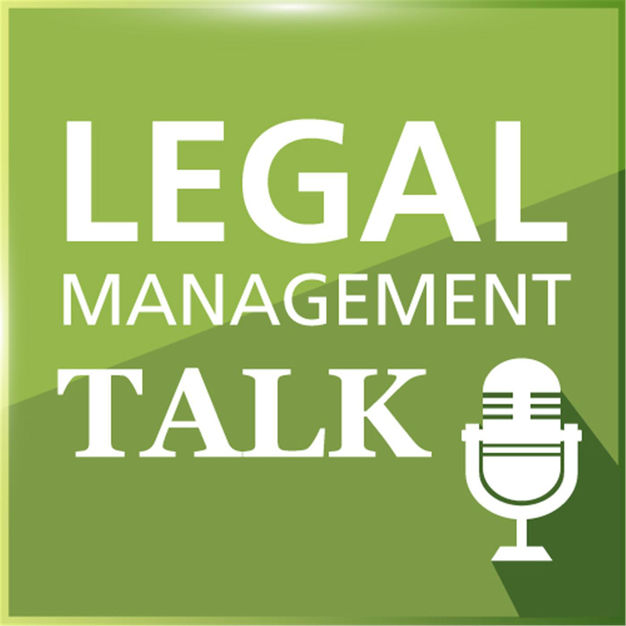 Legal Management Talk
Legal Management Talk
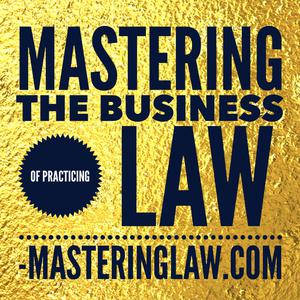 Mastering Your Law Practice: law practice management, law firm marketing, rainmaking, attorney lifestyle
Mastering Your Law Practice: law practice management, law firm marketing, rainmaking, attorney lifestyle
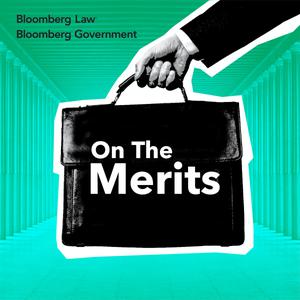 On The Merits
On The Merits
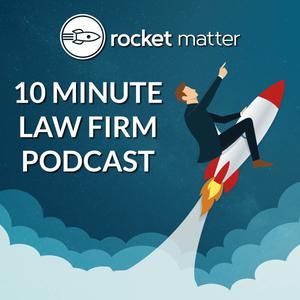 The 10 Minute Law Firm Podcast
The 10 Minute Law Firm Podcast
 Legal Speak
Legal Speak
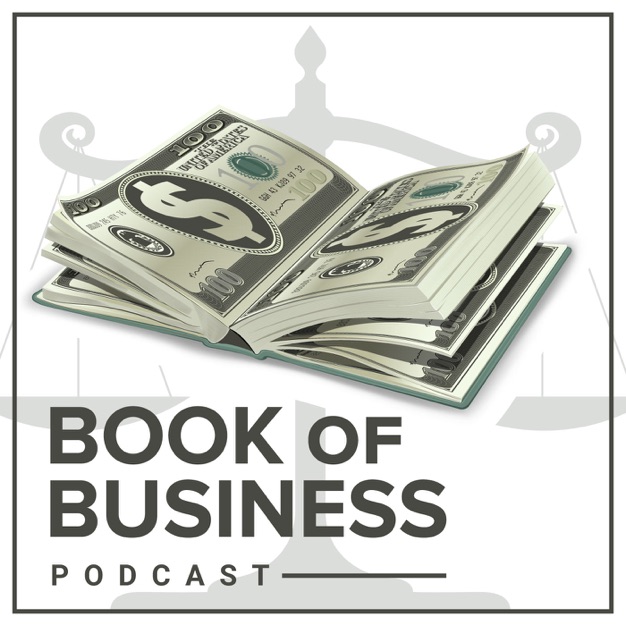 Biglaw Book of Business
Biglaw Book of Business